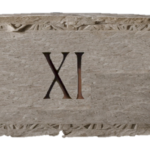The Roman numeral CCCXXXV represents the number 335 in the decimal system. To convert CCCXXXV to numbers, we need to follow these steps:
- Identify the symbols used in the Roman numeral and their corresponding values. The symbols are C (100), X (10) and V (5).
- Arrange the symbols from left to right in decreasing order of their values. The order is CCCXXXV.
- Add the values of the symbols that are not followed by a larger value. In this case, we add C + C + C + X + X + X + V = 100 + 100 + 100 + 10 + 10 + 10 + 5 = 335.
- Subtract the values of the symbols that are followed by a larger value. In this case, there are no such symbols, so we do not need to subtract anything.
- The final result is the sum of the values obtained in step 3 and step 4. In this case, it is 335.
Therefore, CCCXXXV in numbers is 335. You can also use this online converter to check your answer or convert other Roman numerals to numbers.
Decimal to Roman Numerals Converter
There are many interesting facts about the number 335. Here are some of them:
- 335 is the sum of five consecutive primes: 59 + 61 + 67 + 71 + 77 = 335.
- 335 is also the sum of nine consecutive odd numbers: 25 + 27 + 29 + 31 + 33 + 35 + 37 + 39 + 41 = 335.
- In the year 335 AD, Christianity became the official religion of Armenia, making it the first country to adopt Christianity as a state religion. You can read more about the history of Armenia.
- In the year 335 BC, Alexander the Great founded the city of Alexandria in Egypt, which became one of the most important cultural and intellectual centers of the ancient world. You can read more about the legacy of Alexander the Great.
- Pangaea was a supercontinent that existed during the late Paleozoic and early Mesozoic eras. It assembled from earlier continental units approximately 335 million years ago, and it began to break apart about 175 million years ago.
- The average Canadian uses about 335 liters of water each day for domestic purposes. This is more than the average American, Italian, or Swede.
- Gideon v. Wainwright was a landmark case in U.S. Supreme Court history that established the right to counsel for criminal defendants who cannot afford an attorney.
The case involved Clarence Earl Gideon, who was accused of breaking and entering a pool hall in Florida in 1961. He was denied a lawyer at his trial and was convicted and sentenced to five years in prison.
He appealed his case to the Supreme Court, arguing that he was denied his constitutional right to a fair trial. The Supreme Court agreed with him in a unanimous decision in 1963, and ordered a new trial for him.
He was acquitted at his second trial with the help of a court-appointed lawyer.

